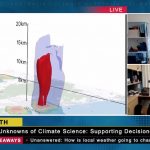 March 18, 2021 11:57 am
Published by Climate Extremes
March 18, 2021 11:57 am
Published by Climate Extremes
Coral reefs are known to produce a chemical called dimethyl sulfide (DMS), which, when released into the atmosphere, can help form or grow tiny particles known as aerosols. Currently, this source of aerosols produced by coral reefs is unaccounted for in climate science and hence the impact of coral reef extinction on aerosols and climate is unknown.
 March 15, 2021 10:10 am
Published by Climate Extremes
March 15, 2021 10:10 am
Published by Climate Extremes
This study uses a high‐resolution climate model to investigate how and why marine heatwaves would change for the Australian region. The relative impacts of increases on background ocean temperature and changes to intrinsic temperature variations are compared.
 March 8, 2021 1:54 pm
Published by Climate Extremes
March 8, 2021 1:54 pm
Published by Climate Extremes
As part of the Future Seas project, this paper summarizes knowledge and perspectives on ocean literacy from a range of disciplines, including but not exclusive to marine biology, socio-ecology, philosophy, technology, psychology, oceanography and human health.
 February 15, 2021 1:22 pm
Published by Climate Extremes
February 15, 2021 1:22 pm
Published by Climate Extremes
There is a great deal of misuse of climate model projections emerging in business. Climate models are being used for some purposes that are simply inappropriate leading to assessments of the physical risks to business that are of no value. However, there are ways to use climate model data that has value and can help business robustly assess some specific climate related risks.
 February 9, 2021 7:47 am
Published by Climate Extremes
February 9, 2021 7:47 am
Published by Climate Extremes
Climate information is at risk of being misconstrued and used inappropriately in financial reports and has the potential to expose businesses to significant risk, according to a new paper by Australian researchers.
 January 15, 2021 9:49 am
Published by Climate Extremes
January 15, 2021 9:49 am
Published by Climate Extremes
CLEX researchers introduced a novel methodology to examine the Southern Ocean's response to changing winds. They performed numerical simulations with a global ocean‐sea ice model suite that spans a hierarchy of spatial resolutions and driven by realistic atmospheric forcing conditions.
 January 7, 2021 9:00 pm
Published by Climate Extremes
January 7, 2021 9:00 pm
Published by Climate Extremes
The 2019/20 Black Summer bushfires are a “wake up call” demonstrating the extreme effects of climate change in Australia, according to a group of experts who’ve published a new study examining the factors that caused the disaster.
 December 18, 2020 6:50 am
Published by Climate Extremes
December 18, 2020 6:50 am
Published by Climate Extremes
Lee Constable interviews Prof Christian Jakob about what we don't know about climate change for her channel on the Cimpatico Studios platform, Climate Australia.
 November 27, 2020 3:25 pm
Published by Climate Extremes
November 27, 2020 3:25 pm
Published by Climate Extremes
Using atmospheric model experiments, researchers have shown that the warming of the tropical Indian Ocean relative to the other two tropical ocean basins can effectively control Walker Circulation changes in the Pacific and Atlantic oceans and influence climate far beyond the Indian Ocean region.
 November 23, 2020 3:56 pm
Published by Climate Extremes
November 23, 2020 3:56 pm
Published by Climate Extremes
CLEX researchers and colleagues examined the contribution to uncertainty in simulated future changes in crop yields using the change-factor method and an additional, more sophisticated, statistical downscaling method of generating realistic future climate data from climate model output.










